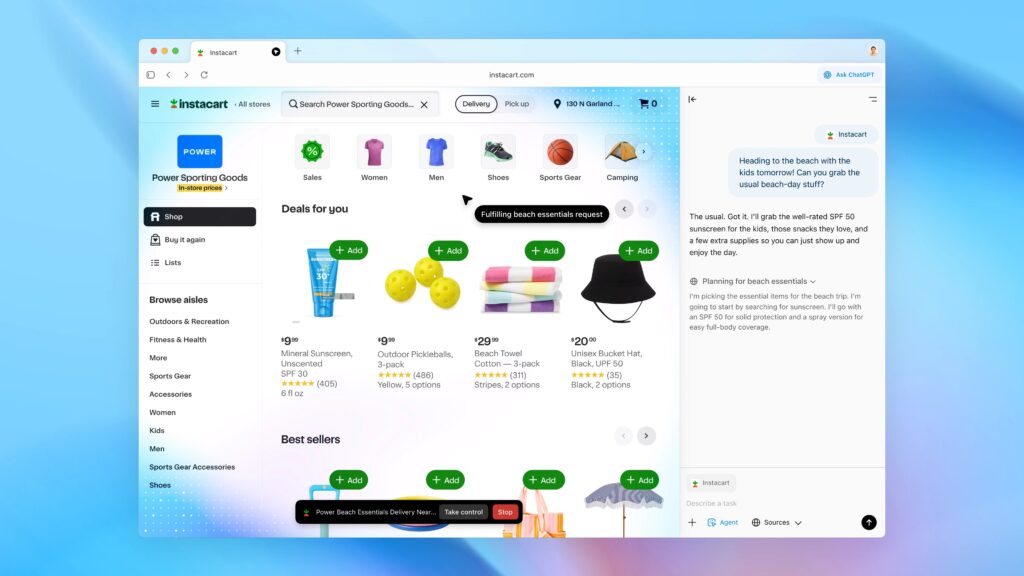The newly launched Atlas Web Browser is redefining how users navigate the internet by blending speed, security, and AI-driven productivity tools. With its focus on privacy and user-centric design, Atlas is emerging as a serious challenger to traditional browsers like Chrome, Safari, and Edge.

By Newswriters.in Tech Desk
A new player has entered the global web browser market — the Atlas Web Browser, a privacy-first and AI-enhanced platform that aims to revolutionize the way people experience the internet. Developed by a team of engineers focused on ethical technology and performance optimization, Atlas is being hailed as a “browser for the modern age,” balancing user empowerment, data safety, and intelligent features.
Built for Privacy and Performance
Unlike mainstream browsers that rely heavily on ad-tracking and data collection, Atlas puts user privacy at the center of its design. The browser does not store browsing history or cookies by default and employs end-to-end encryption for all user data. It also features an integrated VPN and tracker blocker, preventing third-party advertisers from profiling users.
Performance-wise, Atlas claims to be 40% faster in page-loading speeds compared to Chrome and Firefox. Its lightweight architecture ensures low memory usage, making it suitable for both mobile and desktop users.
AI Integration for Smarter Browsing
One of the key highlights of Atlas is its AI assistant, designed to simplify multitasking and research workflows. Users can summarize articles, translate web pages in real time, and generate citations or reports directly from the browser window. The built-in AI can also predict user intent, helping locate relevant information faster — a feature that appeals especially to journalists, researchers, and content creators.
“The goal of Atlas is not just faster browsing — it’s smarter browsing,” said Elena Kovacs, the project’s chief technology officer. “We’re merging artificial intelligence with privacy principles to create a browser that helps users think, not track them.”
An Ethical Alternative in the Age of Surveillance
The launch of Atlas comes at a time when global concerns about digital surveillance, data breaches, and targeted advertising are at an all-time high. Traditional browsers, despite offering “private modes,” often rely on monetizing user data for advertising revenue.
Atlas’ ad-free model, sustained through optional premium plans and AI-powered productivity tools, signals a shift toward ethical internet technology. Experts believe such models could pave the way for a new digital ecosystem where privacy and personalization can coexist.
Impact on the Browser Market
The browser market has long been dominated by tech giants — Google Chrome, Microsoft Edge, Safari, and Mozilla Firefox — which together account for over 90% of global users. However, Atlas’ entry could disrupt this status quo, especially among privacy-conscious and professional users.
Analysts suggest that the rise of Atlas could mirror earlier movements like Brave and DuckDuckGo, which carved their niches through transparency and security. If adoption grows, Atlas could influence established players to rethink their data policies and integrate stronger user protections.
User Reception and Future Outlook
Early adopters have praised Atlas for its intuitive interface, minimalistic design, and lack of intrusive ads. Beta testing communities also reported seamless syncing between devices and strong protection against phishing and malware attacks.
Looking ahead, the Atlas team plans to introduce collaborative browsing tools, allowing users to share notes and annotations in real time — a feature that could be transformative for online learning and digital journalism.
Conclusion
In a crowded browser landscape, Atlas distinguishes itself with its AI innovation, privacy-first approach, and ethical business model. While it remains to be seen whether it can scale to challenge the industry’s biggest players, its emergence reflects a broader shift toward more responsible, intelligent, and user-friendly internet experiences.
Further Reading:
- “The Rise of Ethical Tech: Why Privacy-Focused Apps Are Gaining Ground” – Wired, 2025
- “AI Meets the Browser: The Next Frontier in Web Navigation” – TechCrunch, 2025
- “Data Without Exploitation: The Future of Digital Privacy” – MIT Technology Review, 2024




